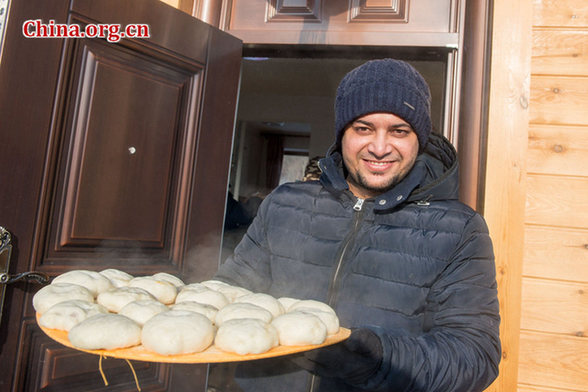Exploring Jilin's winter wonderland
china.org.cn / chinagate.cn by Duncan Gordon, January 23, 2017 Adjust font size:
Winter in northeast China is long. And very cold. During these frozen months, China's northeast corner comes into its own. The countryside becomes caked with snow, and the icy streets of its cities wake up to a bitter frost every day as the sun struggles to break through the morning mist. These conditions lend themselves to a unique and warm winter culture – none more so than in Jilin Province, the heart of northeast China. Jilin has been showing off its winter tourism resources to a group of foreign journalists and students.
Changchun, the industrial but modernised provincial capital, is the usual point of arrival for visitors to Jilin. Several hotels have bedrooms with views over South Lake, a picturesque and perhaps unexpected landscape in this part of the world.
As would be expected in a place that gets this much snow, the local people know how to make the most of it. A short journey out of the city limits takes you to Jingyuetan Lake. The open expanses of frozen lake, bordered by pine tree covered hills, provide the setting for Changchun Ice and Snow Festival. Incredibly accurate snow sculptures loom large over visitors. Giant koalas and kangaroos, usually more comfortable in warmer climes, stare ironically across the frigid landscape. Unerringly precise but scaled-down versions of the Sydney Opera House and Beijing's Temple of Heaven are also impressive.
Just over 100 km away from Jilin, the province showed off one of its true gems to the touring group of foreigners. Jilin's original and largest ski resort, Lake Songhua Resort, is full of boarders and skiers making the most of the perfect powder snow conditions. Founded in 1962, the ski resort has been hosting Chinese and foreign winter sports enthusiasts for a long time – the experience shows. The infrastructure is smart and highly developed, and the slopes are varied, providing opportunities for both advanced skiers and beginners. Dong Dong, head of marketing at Lake Songhua Resort, said that last year 210,000 skiers and boarders took to the slopes, most of them coming from China, with significant numbers from Japan, South Korea and Russia as well.
The jewel in Jilin's winter tourism crown is probably Wusong Island (Rime Island). The destination became a tourist attraction in the 1990s after some photographers took stunning photographs of the natural rime phenomenon on the island. Rime forms when water droplets in fog freeze to the tree branches. The process creates a beautiful effect, and the frozen trees look incredibly delicate as they glisten in the sunlight. Wusong Island lies on the mammoth Songhua River, which flows from its source high up in the Changbai Mountains into the Heilongjiang River. Cultural tourism is an important part of what Jilin has to offer visitors. The group of foreign visitors were introduced to a typical Manchu ethnic group family home in Hantun Village, complete with decorations ready for Spring Festival. Tourists travelling to Jilin will have the chance to stay with local families and experience a wholly different and genuine culture.
There is only one proper way to deal with the cold in China – hotpot. The foreign entourage enjoyed a traditional Chinese hotpot, with Jilin's own special take on the ubiquitous meal in a local restaurant. There were happy faces all around.
